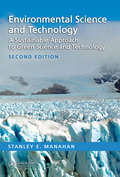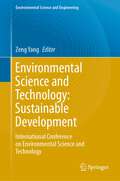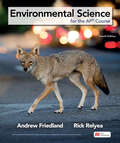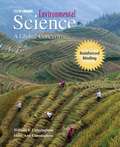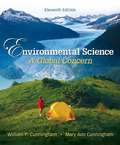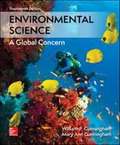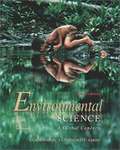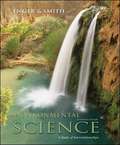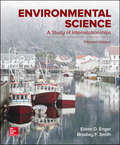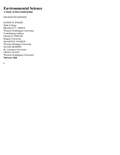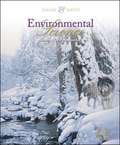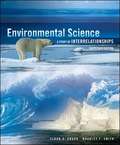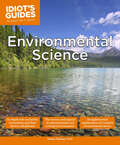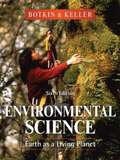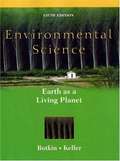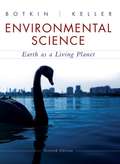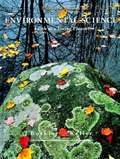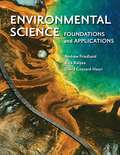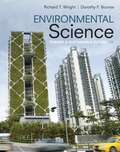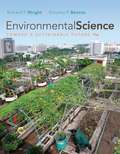- Table View
- List View
Environmental Science and Technology: A Sustainable Approach to Green Science and Technology, Second Edition
by Stanley E. ManahanFormally established by the EPA nearly 15 years ago, the concept of green chemistry is beginning to come of age. Although several books cover green chemistry and chemical engineering, none of them transfer green principles to science and technology in general and their impact on the future. Defining industrial ecology, Environmental Science and Tec
Environmental Science and Technology: International Conference on Environmental Science and Technology (Environmental Science and Engineering)
by Zeng YangThis book features a collection of high-quality and peer-reviewed papers from 2022 13th International Conference on Environmental Science and Technology, which was held in Shandong, China, during October 21–23, 2022. ICEST is held annually as a platform for presentation of new advances and research results in the fields of Environmental Science and Technology. This year, we focus on the theme: Environmental Protection and Sustainable Development. With the continuous development of human society, environmental problems are becoming more and more serious. How to realize the rational use of resources, realize the sustainable development of ecological environment, and protect the environment on which human beings live has become an urgent problem to be solved. Based on the conference theme this year, the presentations include the topical areas of environmental sustainability, environmental restoration, waste minimization, solid waste management, water pollution control, water treatment and reclamation, air pollution control, carbon capture and storage and environmental monitoring, etc.
Environmental Science for the AP® Course
by Andrew Friedland Rick RelyeaFriedland/Relyea helps students gain the knowledge and skills needed to succeed on the AP® exam.
Environmental Science: A Global Concern
by William P. Cunningham Mary Ann CunninghamColor photos and diagrams illustrate this text for undergraduate students with little or no science background. Material is divided into five sections on environmental science and ecological principles; population, economics, and environmental health; food, land, and biological resources; physical resources; and society and the environment, emphasizing the global environment, a holistic approach, and sustainable development. This third edition contains new boxes on current topics including electromagnetic fields and biotechnology.
Environmental Science: A Global Concern
by William P. Cunningham Mary Ann CunninghamFor undergraduate students with little or no science background. Material is divided into five sections on environmental science and ecological principles; population, economics, and environmental health; food, land, and biological resources; physical resources; and society and the environment, emphasizing the global environment, a holistic approach, and sustainable development. This third edition contains new boxes on current topics including electromagnetic fields and biotechnology. Annotation c. by Book News, Inc. , Portland, Or.
Environmental Science: A Global Concern
by William P. Cunningham Mary Ann CunninghamEnvironmental Science: A Global Concern is a comprehensive presentation of environmental science for non-science majors which emphasizes critical thinking, environmental responsibility, and global awareness. This book is intended for use in a one or two-semester course in environmental science, human ecology, or environmental studies at the college or advanced placement high school level. As practicing scientists and educators, the Cunningham author team brings decades of experience in the classroom, in the practice of science, and in civic engagement. <P><P>This experience helps give students a clear sense of what environmental science is and why it matters in this exciting, new 14th edition. <P><P>Environmental Science: A Global Concern provides readers with an up-to-date, introductory global view of essential themes in environmental science. The authors balance evidence of serious environmental challenges with ideas about what we can do to overcome them. An entire chapter focuses on ecological restoration; one of the most important aspects of ecology today. Case studies in most chapters show examples of real progress, and “What Can You Do?” lists give students ideas for contributing to solutions.
Environmental Science: A Global Concern
by William P. CunninghamThis book is intended for use in a one- or two-semester course in environmental science, human ecology, or environmental studies at the college or advanced placement high school level. Because most students who will use this book are freshman or sophomore nonscience majors, the authors have tried to make the text readable and accessible without technical jargon or a presumption of prior science background. At the same time, enough data and depth are presented to make this book suitable for many upper-division classes and a valuable resource for students who will keep it in their personal libraries after their formal studies are completed. The goal of this book is to provide an up-to-date, introductory view of essential themes in environmental science along with emphasis on details and case studies that will help students process and retain the general principles.
Environmental Science: A Study Of Interrelationships (A/P Environmental Science Ser.)
by Bradley F. Smith Eldon D. EngerNIMAC-sourced textbook
Environmental Science: A Study of Interrelationships
by Bradley F. Smith Eldon D. EngerThis full-color, introductory environmental science text is known for being concise, conceptual, and value-priced. The approach and reading level cover the basic concepts without overloading students with too much detail. The authors reinforce the text's central theme of "interrelationships" by providing a historical perspective, information on economic and political realities, discuss the role of different social experiences, and integrate this with the crucial science to describe the natural world and how we affect it.
Environmental Science: A Study of Interrelationships
by Bradley F. Smith Eldon D. EngerThis environmental science text is known for being concise, conceptual, and value-priced. The approach and reading level cover the basic concepts without overloading students with too much detail. The authors reinforce the text's central theme of "interrelationships" by providing a historical perspective, information on economic and political realities, discuss the role of different social experiences, and integrate this with the crucial science to describe the natural world and how we affect it.
Environmental Science: A Study of Interrelationships
by Bradley F. Smith Eldon D. EngerEnvironmental Science: A Study of Interrelationships is a full-color, introductory environmental science text that is known for being concise, conceptual, and value-priced. The approach and reading level cover the basic concepts without overloading students with too much detail. <p><p>The authors reinforce the text's central theme of "interrelationships" by providing a historical perspective, information on economic and political realities, discuss the role of different social experiences, and integrate this with the crucial science to describe the natural world and how we affect it.
Environmental Science: A Study of Interrelationships (10th edition)
by Bradley F. Smith Eldon D. EngerThe book is an introductory environmental science text covering the basic concepts.
Environmental Science: A Study of Interrelationships (Thirteenth Edition)
by Bradley F. Smith Eldon D. EngerThe book provides information and the conceptual framework needed to understand complex issues so that readers can comprehend the nature of environmental problems and formulate their own views.
Environmental Science: An In-Depth Look at Earth’s Ecosystems and Diverse Inhabitants (Idiot's Guides)
by James DaurayEnvironmental science is an integrated, interdisciplinary field that combines the study of ecology, physics, chemistry, biology, soil science, geology, atmospheric science, and geography. It is among the top 10 most popular Advanced Placement examinations taken by high school seniors in an effort to receive postsecondary college credit. Idiot's Guides: Environmental Science provides a step-by-step review of the disciplines that comprise environmental science, helping students grasp the basic concepts, internalize the information, and prepare for exams. Features include: The basics and history of the human relationship with the natural environment. The ways species grow, change, and interact. A detailed description of the earth's ecosystems, including deserts, grasslands, forests, and aquatic ecosystems. The effects of economics and agriculture on the environment. The various types of energy humans use, as well as how its production impacts the earth's ecosystems, with a focus on renewable energy sources. The ill effects of a growing population, including pollution, toxins, bacteria, waste, and global warming/climate change.
Environmental Science: Earth As a Living Planet
by Daniel B. Botkin Edward A. KellerUpdated and revised to include the latest research in the field, the new Sixth Edition of Environmental Science continues to present a balanced analytical and interdisciplinary approach to the field. This approach equips readers with a solid scientific background in environmental science, so they can think through environmental issues and make their own decisions. Five central themes are weaved throughout the book: Human Population Growth, Sustainability, A Global Perspective, An Urban World, and Science and Values.
Environmental Science: Earth as a Living Planet
by Daniel B. Botkin Edward A. KellerAn introductory textbook that presents the most important concepts in the study of the environment from an analytical and interdisciplinary perspective, and encourages students to formulate their own thoughts about environmental problems. Annotation c. by Book News, Inc. , Portland, Or.
Environmental Science: Earth as a Living Planet
by Daniel B. Botkin Edward A KellerEnvironmental Science: Earth as a Living Planet provides an up-to-date introduction to the study of the environment. Information is presented from an analytical and interdisciplinary perspective from which we must view environmental issues in order to deal successfully with them. The goal is to teach the students how to think through environmental issues.
Environmental Science: Earth as a Living Planet
by Daniel B. Botkin Edward A. KellerFor more than two decades, Botkin has been active in the application of ecological science to environmental management. Updated and revised to include the latest research in the field, the new edition of 'Environmental Science' continues to present a balanced analytical and interdisciplinary approach to the field.
Environmental Science: Earth as a Living Planet (3rd edition)
by Daniel B. Botkin Edward A. KellerAn introductory textbook that presents the most important concepts in the study of the environment from an analytical and interdisciplinary perspective, and encourages students to formulate their own thoughts about environmental problems. Annotation C. by Book News, Inc., Portland, Or.
Environmental Science: Ecology and Human Impact
by Leonard Bernstein Alan Winkler Linda Zierdt-WarshawEnvironmental Science: Ecology And Human Impact. As the title dictates, this book works on ecology people and the effects of their activities on the environment. It takes the readers in an in-depth study by introducing the earth and its the composition to the reader; second, the People and the Environment all this aiming towards understanding the environment and promoting a sustainable future.
Environmental Science: Foundations and Applications
by Andrew Friedland Rick Relyea David Courard-HauriCreated for non-majors courses in environmental science, environmental studies, and environmental biology, Environmental Science: Foundations and Applications emphasizes critical thinking and quantitative reasoning skills. Students learn how to analyze graphs, measure environmental impact on various scales, and use simple calculations to understand key concepts.With a solid understanding of science fundamentals and how the scientific method is applied, students are able to evaluate information objectively and draw their own conclusions.
Environmental Science: Toward A Sustainable Future (Ninth Edition)
by Tony WrightOur ecological footprint weighs heavily on Earth's natural resources the "ecosystem capital" that provides the goods and services that sustain human life and economic well-being.
Environmental Science: Toward a Sustainable Future
by Richard Wright Dorothy BoorseFor introductory courses in Environmental Science, Environmental Studies, and Environmental Biology. Known for its currency and readability, this text focuses on enabling students to critically evaluate the latest environmental issues and to apply that understanding to situations and events in their everyday lives. <p><p>It explores the interactions of humans within the natural environment and probes issues thoroughly examining their scientific basis, their history, and society's response. The authors discuss sustainable development and public policy in terms of how they shape the present and future.
Environmental Science: Toward a Sustainable Future (10th Edition)
by Richard T. Wright Bernard J. NebelAs the field of environmental science continues to evolve, this highly readable guide presents a full spectrum of views and information to help readers evaluate issues and make informed decisions. Reflects the changing environmental scene worldwide, with a wide range of viewpoints and information from the latest sources. Places new emphasis on issues such as emerging diseases like avian flu; the 4 th World Water Forum; the "gene revolution;" the Endangered Species Act controversy; restoration of the Everglades, and the 2005 Global Forest Resources Assessment. Strives for a balance between pure science and the political, social, and historical perspectives of environmental affairs. For those interested in learning more about environmental science.
Environmental Science: Toward a Sustainable Future (11th edition)
by Richard T. Wright Dorothy F. BoorseBy emphasizing the memorable themes of science, sustainability and stewardship, the Eleventh Edition of this popular textbook helps you understand the science behind environmental issues and what you can do to build a more sustainable future.
